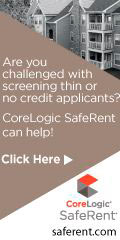Protecting Yourself Against a Personal Injury Lawsuit
 Print this Article | Send to Colleague Print this Article | Send to Colleague
If you own or manage an apartment community, you must make your property "reasonably safe" for tenants and guests. Florida law mandates this requirement. But what happens when someone claims to be injured on your property due to the work of an outside contractor? In that situation, the injured person could sue the contractor, the apartment community or both. Still, owners, managers and contractors can take steps to greatly reduce their risk of liability. The first installment of this article focuses on owners and managers:
1. Document your research.
Research the contractor’s credentials and keep a paper trail. If you research him online, print a page from the websites you visit. If you make phone calls to check his references, make detailed notes of who you called, when you called and what those references told you. Then keep all these papers together in a file that will not get lost. If one day you find yourself in court, you will have hard evidence to show you did your homework before hiring the contractor. In other words, this documentation can help prove you made reasonable efforts to find a safety-conscious contractor.
2. Get it in writing.
Most contractors will have a basic contract or work order. But look at it carefully. Does it require you to "indemnify" the contractor? If so, this means you are agreeing to take full responsibility for the contractor in the event his negligence causes an injury. You would not want to enter into any agreement containing this provision. Even if the contractor is an old friend and does not usually generate any paperwork for his jobs, see if you could get at least the basic terms on paper. The scope of the work could be important in the event you are dragged you into a lawsuit.
3. Make a plan.
Know when and where the work will be done, how long it will take and how it will affect your tenants. Will the work generate a lot of debris? A lot of noise? Irritating or dangerous fumes? This information can help you and the contractor structure the work so the fewest number of tenants come into contact with the work area. The less traffic through the work area, the less chance of injury to passersby.
Also, talk to the contractor about how he plans to make the work area safe. Caution cones? Caution tape? Barricades? If the job will take more than one day, arrive at an understanding as to the condition in which the contractor will leave the worksite at the end of each day. The worksite should be left in a reasonably safe condition overnight. This may require the contractor to perform a bit of extra work before leaving for the day.
4. Alert your tenants.
The common practice is to alert tenants, usually by way of fliers, about upcoming work on the property. But what is far less common is the practice of saving copies of those fliers. When hiring a contractor, put a copy of the flier with the rest of the paperwork relating to the job. In the event of a lawsuit, you would want the jurors to be able to hold the flier in their hands and read it for themselves.
5. Don’t lend your tools.
Tell the contractor up front your company policy prohibits you from lending any tools or supplies for the work. If the injured tenant blames the tools the contractor used, you do not want to be found the owner of those tools. Otherwise, the tenant may argue it was your job to make sure the tools were maintained and operated correctly.
6. Inspect the job.
At the end of the job, perform a walk-through with the contractor. In addition to checking the quality of the work, make sure the work area is free of any tools or debris that could pose a hazard.
7. Notify your insurer immediately.
When an injury occurs, inform your insurer right away, even if you believe the claim should go through the contractor’s insurance company. If you are not at fault, your insurer can work with the contractor’s insurer to resolve the claim. Even if it turns out you are partly at fault, your insurer would want to begin working on the claim right away and arrive at an early resolution if possible.

Following these simple steps could go a long way toward protecting you against a personal injury lawsuit.
Michael L. Forte is an attorney at the Tampa office of Rumberger, Kirk & Caldwell, P.A. He defends apartment communities in lawsuits throughout Florida.
|




